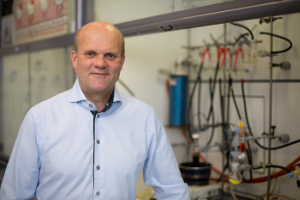Big research funding for cheap metals
Prof. Dr. Sjoerd Harder receives ERC Advanced Grant
The team around Prof. Dr. Sjoerd Harder, Chair of Inorganic and Organometallic Chemistry at FAU, has been funded with the highest European research grant. With a highly competitive ERC-Advanced Grant of 2,5 Million Euro, the scientific team will investigate how non-noble metals can carry out noble tasks.
Project MM-ZERO
The research project MM-ZERO focuses on main group metals in the zero-oxidation-state. Not just in the metallic state but also as molecular complexes. Zero-valent metal complexes can be prepared for metals like platinum or palladium. These noble transition metals do not easily oxidise and often are used in catalysis. However, the synthesis of zero-valent main group metal complexes is a real challenge. This is especially true for the electropositive early main group metals that easily lose electrons. Harder recently reported concepts to stabilize zero-valent magnesium complexes [1]. These soluble „atomic metals” are highly reactive and open up new possibilities which only partially have been disclosed. They are of special interest in breaking the strongest chemical bonds. In this context, Harder reported on the activation of the dinitrogen triple bond, one of the strongest known chemical bonds, with a simple metal like calcium [2]. And this brings us to the second pillar of the project: catalysis.
“Since more than 25 years, we are very successful in doing catalysis with cheap main group metals and published the very first book on this subject [3]”, says Prof. Harder. “It is not only about the price of the metal but also toxicity and natural abundance are a factor. A metal like calcium is fully harmless and you will find it in your own garden. In current times, geopolitical independence is more important than ever! New is that now the pure main group metals are investigated in heterogeneous catalysis. Transition metals like nickel, palladium or platinum are classical heterogeneous catalysts. Beyond expectation, we found that pure metallic barium is a surprisingly efficient hydrogenation catalyst [4]. It gets even better: if you mix it with iron, you boost the activity with a factor of 1.000 [5]! We are of course not talking about lumps of metal. Together with FAU-Emeritus Prof. Ulrich Zenneck, we evaporate the metals and condense them as highly reactive, nanostructured metal particles.”
“We will soon extend our team with other highly motivated researchers that are not afraid to meet challenges”, he continues.”Indeed, it is difficult chemistry – but we know what we are doing and we have a research group that trains and helps each other out. Our goal? With combinations of the most abundant metals in the earth‘s crust, magnesium, calcium, aluminium or iron, we will develop new hydrogenation catalysts that may substitute noble metals like platinum. This way, the FAU may contribute in a special way to sustainable hydrogen storage. Or maybe even the conversion of dinitrogen in ammonia, one of the most important large industrial processes that also today needs huge amounts of energy. We are looking forward to start soon!”
Publications
[1] B. Rösch, T. X. Gentner, J. Eyselein, J. Langer, H. Elsen, S. Harder*, Nature 2021, 592, 717.
[2] B. Rösch, T. X. Gentner, J. Langer, C. Färber, J. Eyselein, L. Zhao, C. Ding, G. Frenking*, S. Harder*, Science 2021, 371, 1125.
[3] S. Harder, Early Maingroup Metals in Catalysis: Concepts and Reactions (Wiley-VCH, Weinheim, Germany, 2019).
[4] P. Stegner, C. Färber, U. Zenneck, C. Knüpfer, J. Eyselein, M. Wiesinger, S. Harder* Angew. Chem. Int. Ed. 2021, 60, 4252.
[5] C. Färber, P. Stegner, U. Zenneck, C. Knüpfer, G. Bendt, S. Schulz, S. Harder*, Nature Commun. 2022, 13, 3210.
More information
Prof. Dr. Sjoerd Harder, PhD
Department of Chemistry and Pharmacy
Chair of Inorganic and Organometallic Chemistry (Prof. Dr. Harder)
- Phone number: +49913185-27350
- Email: sjoerd.harder@fau.de

